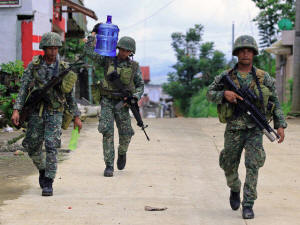|
General leading Philippine battle with
Islamists relieved of command
 Send a link to a friend
Send a link to a friend
 [June 02, 2017]
By Tom Allard [June 02, 2017]
By Tom Allard
MARAWI CITY, Philippines (Reuters) - The
general leading an offensive against pro-Islamic State militants holed
up in a southern Philippine town has been relieved of his command, an
army spokesman said on Friday, the 11th day of the country's biggest
security crisis in years.
The removal of Brigadier-General Nixon Fortes as commander of the army
brigade in Marawi City and his replacement by his deputy, Colonel
Generoso Ponio, was not related to the battle that has raged in the
city, the spokesman said.
Asked if the course of the conflict was the reason for Fortes'
replacement, spokesman Lieutenant-Colonel Ray Tiongson said: "That's not
the reason."
Fortes was appointed commander of the army's 103rd Brigade in January
and oversaw a series of operations to disrupt the Maute, a group that
has sworn allegiance to Islamic State which later laid siege to Marawi
City.
A military source, speaking on condition of anonymity, said Fortes was
dismissed because not all his forces were in the city when the rebels
began their rampage, even though military intelligence had indicated
that Islamist militants, including foreign fighters, were amassing
there.
The source said that some of Fortes' forces were busy fighting a small
band of communist insurgents in a nearby town when some 400 militants
overran Marawi City on May 23 after a botched military raid to capture
their leader, Isnilon Hapilon.

Thirty-nine members of the security forces have been killed in the
Marawi City battles, as well as 19 civilians and 120 rebel fighters.
DEADLINE MISSED
In fighting on Friday, Philippine planes dropped bombs and helicopters
delivered rockets on militants' fortified positions.
Several buildings were set alight as the military tried to flush out
about 100 fighters to meet a deadline set by Defense Secretary Delfin
Lorenzana to re-take the city of 200,000 people by the end of the day.
"I don't think we can meet the deadline to completely free Marawi of
every single armed element on every street," military spokesman
Restituto Padilla told reporters. "We're working and doing our best to
accomplish this mission."
Padilla said operations were slow because militants had taken civilians
as hostages, using women and children as human shields in fortified
commercial buildings in the city center.
On Friday, two OV-10 close-air support aircraft resumed bomb runs,
circling the city then diving steeply before dropping their ordnance.
Smaller SF 260 planes accidentally dropped a payload on ground troops,
killing 10 and wounding seven, on Wednesday. The incident was an
accident of the sort that sometimes happens in the "fog of war", the
military said.
[to top of second column] |

Soldiers walk along the main street in Mapandi village as government
troops continue their assault on insurgents from the Maute group,
who have taken over large parts of Marawi City, Philippines June 2,
2017. REUTERS/Romeo Ranoco

ROTTING CADAVERS
While civilians are endangered by the air strikes, the military
believes they are essential to a quick victory, with at least 2,000
people trapped by the fighting and fast running out of food and
water.
Militant snipers on top of buildings have complicated the use of
ground troops and forced the military to rely on air power,
Lieutenant Colonel Jo-Ar Herrera, the military's spokesman in
Marawi, said on Thursday.
"A sniper on a building can pin down all the troops, so one way to
neutralize that is to use precision air strikes," he said.
Resident Alan Ampaso said 50 houses in his neighborhood burned down
after being hit by a rocket fired by a helicopter on Friday.
"We just ran and I can't find my wife, my son, my daughter," he
said, distraught and weeping. "I have lost every single thing. I
have no money, no home, no family. Please help me."
On Friday, the International Committee of the Red Cross (ICRC)
raised the problem of decomposing bodies with the provincial
government, noting only 19 bodies of the dead had been recovered
since the conflict began.
"There are a lot of dogs hunting around town. They are starving.
They are eating the bodies," Roberto Petronio, head of the ICRC's
Mindanao sub-delegation told Reuters. "We warned the authorities
that there is a risk of an outbreak of rabies."
(Additional reporting by Manuel Mogato in MANILA; Writing by John
Chalmers; Editing by Robert Birsel)
[© 2017 Thomson Reuters. All rights
reserved.]
Copyright 2017 Reuters. All rights reserved. This material may not be published,
broadcast, rewritten or redistributed.

 |